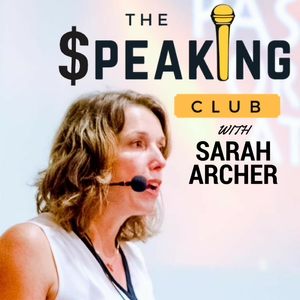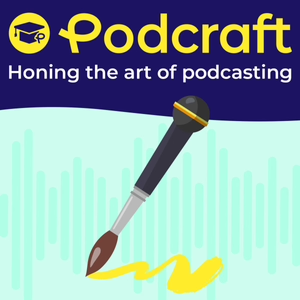
Ruth Wylie
03/22/22 • 38 min
Episode 12: Applied Imagination and the Possibilities of School
We know what it means to teach history. But what does it mean to teach the future? Ruth Wylie applies imagination and critical thinking to big questions about science, technology, artificial intelligence, and what it means to shape the futures we want to see.
Guest: Ruth Wylie
Resources and Expanded Show Notes
In This Episode:
- “I think that even, you know, at maybe the most basic, but also perhaps some of the most profound, is to start to think about how to get futures thinking and foresight anticipation into our K-12 curriculum. So starting to encourage our young people to think about what are possible futures for themselves, but also getting away from the individual level and looking about what are possible futures for our communities, for our countries, for our world.” (5:44)
- “So when we're talking about futures, it's also about reflecting on our histories, our past, the indigenous knowledge. It's reflecting on what's happening today. And then it's about thinking about futures. So again, it's not about just creating a brand new course and hiring brand new teachers, but it's about creating a culture of futures thinking and embedding that into our everyday classroom practice.” (8:29)
- “And so we need to also be thinking about how we're building technologies to address equity, to address people across different lifespans, different spectrums. And I think it's really important again, that if we're going to be making decisions that have larger community, global, national impacts, we need to make sure that people from all of those different spheres are at the table when designing those technologies and thinking about the implications.” (18:50)
- “Agency is a construct that we talk a lot about at the center, and about how do we develop agency and shift that mindset away from ‘the future is going to be unveiled at the next press conference or it's being done by folks in white lab coats,’ and we really take and empower people to realize that they have agency over their future.” (27:48)
Hosted on Acast. See acast.com/privacy for more information.
Episode 12: Applied Imagination and the Possibilities of School
We know what it means to teach history. But what does it mean to teach the future? Ruth Wylie applies imagination and critical thinking to big questions about science, technology, artificial intelligence, and what it means to shape the futures we want to see.
Guest: Ruth Wylie
Resources and Expanded Show Notes
In This Episode:
- “I think that even, you know, at maybe the most basic, but also perhaps some of the most profound, is to start to think about how to get futures thinking and foresight anticipation into our K-12 curriculum. So starting to encourage our young people to think about what are possible futures for themselves, but also getting away from the individual level and looking about what are possible futures for our communities, for our countries, for our world.” (5:44)
- “So when we're talking about futures, it's also about reflecting on our histories, our past, the indigenous knowledge. It's reflecting on what's happening today. And then it's about thinking about futures. So again, it's not about just creating a brand new course and hiring brand new teachers, but it's about creating a culture of futures thinking and embedding that into our everyday classroom practice.” (8:29)
- “And so we need to also be thinking about how we're building technologies to address equity, to address people across different lifespans, different spectrums. And I think it's really important again, that if we're going to be making decisions that have larger community, global, national impacts, we need to make sure that people from all of those different spheres are at the table when designing those technologies and thinking about the implications.” (18:50)
- “Agency is a construct that we talk a lot about at the center, and about how do we develop agency and shift that mindset away from ‘the future is going to be unveiled at the next press conference or it's being done by folks in white lab coats,’ and we really take and empower people to realize that they have agency over their future.” (27:48)
Hosted on Acast. See acast.com/privacy for more information.
Previous Episode

Jill Vialet
Episode 11: The Importance of Play in Schools
Societies depend on our ability to “play well together.” That concept is at the heart of Jill Vialet’s revolutionary work. But at a time when there are so many perceived threats to our well-being from external forces, how can we convince leaders of the importance of play? And what unique value does play bring to our schools and communities?
Guest: Jill Vialet
Resources and Expanded Show Notes
In This Episode:
- “We're not totally comfortable with silly. We are a culture that, you know, in many ways, still very much buys into sort of the Horatio Alger myth about pulling yourself up by the bootstraps and, you know, it's diligence and hard work that's going to overcome obstacles..I just think teachers and people in schools are in a really difficult position.” (6:04)
- “I think one of the things that play tells us over and over again is, given the right sort of stepping stones to achieve that, kids are capable of quite rigorous negotiation and compromise and insight around how to take care of each other. So often, I would say, better than their adult counterparts.” (16:25)
- “I think our kids are amazing. And, and they are capable of so much and we need them so desperately to find their own agency and leadership. Like the very future of our planet is, is depending on their ability to do a better job than we have done. And so I feel like trust your gut, they can do it.” (19:45)
- “ I think American democracy has always been an experiment. Some aspects maybe need to be rethought. We've gotten a little sclerotic in our willingness to be innovative in democracy. But again, a playfulness, a willingness to experiment, a sort of-- an openness to tapping creativity and how we do it. Like, and again, it's like, think about, if you are an educator listening, about the kids. If you think about kids playing, their ability to self handicap, like Jill and Tim, you switch sides. Like that's a pretty nuanced human interaction. Or like, Ooh, this rule is not working. Let's, let's change it up so that, like, this is the boundary instead. Like that spontaneous sort of re-imagining of how we work together, that's what's needed for us to navigate this moment.” (24:38)
- “I guess I'm hoping that we come to recognize that actually the education of our youngest citizens is foundational to our ability to navigate the current challenges we seek, whether that's climate or misinformation or all the myriad things that are worrisome in this moment. That ultimately educating our young people well, it's, it's the only hope that we will actually address any of these challenges. But to do that, you need humans who are cared for as well.” (34:25)
Hosted on Acast. See acast.com/privacy for more information.
Next Episode

Matthew Barzun
Episode 13: Giving Away Power for More Authentic Leadership
We’re used to working and teaching in hierarchical structures, where power flows from the top down. But what would happen if, instead of maintaining power at the top, leaders gave power away to others? How could sharing power change the way we work, the way we relate to others, and the way we approach problem-solving? And what would schools look like if everyone was part of a constellation of contributors?
Guest: Matthew Barzun
Resources and Expanded Show Notes
In This Episode:
- “The problem with power sharing is it, because so much of us are in this pyramid mindset, it's sort of like, well, if I have 10 units and we share it, I guess I'll have five and you have five now. But what all these amazing leaders who inspired me realized was no, no, no, power isn't a finite thing, like something you mine in Western or Eastern Kentucky, like coal. It is something, it is infinite, and you make it. And you make it with other people sitting around a table, virtual or real. And it all begins with giving away power.” (14:28)
- “Diversity and division. They have the same root, ‘div’. So what they love most and fear most has something to do with separateness. And so that, you know, now we see where it ends with the constellation. I was like, so they want to stand out as an individual like me, but they don't want to stand out so much that they're lonely. Right? So they want to stand out and fit in. And then I was like, boy, do we have a good image for that in the form of a constellation. Stand out, be special and form something special to you. Easy to say, hard to do.” (30:57)
- “We want freedom together. And not some mushy compromise, right? Half freedom, half together. Freedom with and through one another...the hard part was how could we figure out how to be free together? Thirteen separate colonies. And we did a constitution and we, you know what I mean, all that kind of stuff. And we had a motto for it: From Many One. And we had an image that was supposed to go—remember, he named that ship the USS Constellation. We had an image that's supposed to go with that motto.” (43:37)
- “It cannot be isolated to the teacher or to the student or to the comedian or to the thing. It's this mutuality, it's this interdependence. It's the invisible. When someone shows you Orion's Belt, right? The lines aren't there, you have to imagine them. And then once you've seen them, you can't unsee them. And so that, I think, is what's going on here, that if we can find those connections, pass them onto the next generation, they will be alive and not be able to unsee them and be able to build useful, much more powerful things together than we could on our own.” (47:25)
Hosted on Acast. See acast.com/privacy for more information.
If you like this episode you’ll love
Episode Comments
Generate a badge
Get a badge for your website that links back to this episode
<a href="https://goodpods.com/podcasts/new-view-edu-185344/ruth-wylie-20044336"> <img src="https://storage.googleapis.com/goodpods-images-bucket/badges/generic-badge-1.svg" alt="listen to ruth wylie on goodpods" style="width: 225px" /> </a>
Copy




